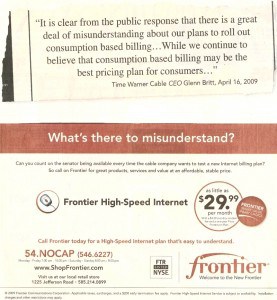One of the reasons StoptheCap! always believed Time Warner chose the cities it did for its cap experiment was to steer clear of Verizon, particularly where the company offers its fiber optic service to homes. Verizon FiOS does not cap Internet usage and has made that well known.
The blowback from Time Warner’s experimental caps wasn’t just limited to the cities “lucky” enough to be chosen. The story went national, and now competitors are moving in to take advantage of Time Warner’s public relations catastrophe and poach their customers.
Verizon is now offering customers in FiOS territories a bundle of services that are priced well below what Time Warner is charging people in nearby cities where FiOS isn’t. For $94.99 a month for the first year ($99.99 a month for the second), they are bundling an unlimited digital phone service, a basic cable package with up to 295 channels and a dozen HD channels, and broadband service at 10Mbps down and 2Mbps up! Oh, and they’ll also give you a $150 rebate in the form of a debit card. I pay $170 a month to Time Warner in Rochester and don’t even get their digital phone product, and standard Internet service here is 10Mbps down and a silly 384Kbps up. Ahhh… competition.
And Verizon will, for $10 more, give you 20Mbps down and 5Mbps up, as well as 350 channels, more than 50 in HD. I have to pay $10 more here and that only gives me “Turbo” Road Runner offering 15Mbps down and 1Mbps up (plus the Powerboost gimmick). That’s it.
Verizon High Speed Internet DSL Service For $18 A Month
Now you see why Time Warner doesn’t dare try their cap experiment in a community where FiOS is available. Why would anyone stay a customer? Heck, even if you wanted to stay with Time Warner for phone and television service, you can buy faster broadband from Verizon on their 10/2 tier for $45 a month, and no caps.
Verizon also gets to target communities where FiOS isn’t yet available, but Time Warner’s threatened caps were, with a guaranteed two year contract-fixed price for DSL comparable to Road Runner Lite for $18 a month. Or they’ll sell their highest DSL tier (7.1Mbps down/768kbps up) for $38 a month and no modem rental fee. No caps there either.
 Frontier continues to enjoy smacking Time Warner around for its duplicitous “caps are about you saving money” campaign. In the Sunday Rochester Democrat & Chronicle, they took another shot at Time Warner’s CEO Glenn Britt for accusing customers of “misunderstanding” their plan, where they try and convince customers that emptying their wallets and handing more money over to Time Warner is somehow a good thing.
Frontier continues to enjoy smacking Time Warner around for its duplicitous “caps are about you saving money” campaign. In the Sunday Rochester Democrat & Chronicle, they took another shot at Time Warner’s CEO Glenn Britt for accusing customers of “misunderstanding” their plan, where they try and convince customers that emptying their wallets and handing more money over to Time Warner is somehow a good thing.
Thanks to StoptheCap! reader Bob for sending along the Frontier ad. Now, if Frontier had not lost the first self-install kit they sent our way (and are supposedly re-shipping express mail to arrive here today), we could have been hooked up by now.


 Subscribe
Subscribe


